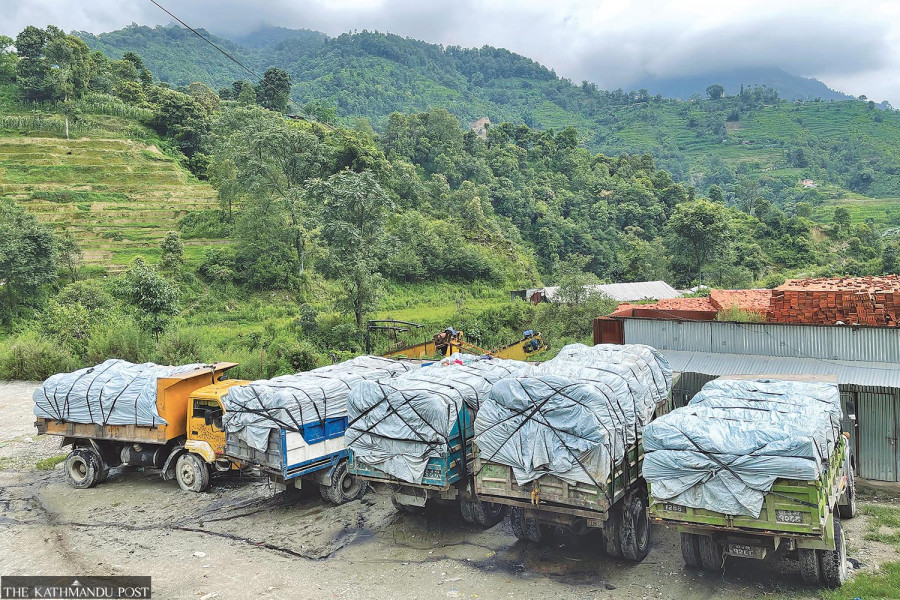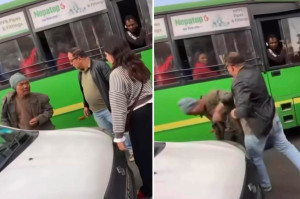Kathmandu
Locals block waste disposal at Bancharedanda landfill
Door-to door waste collection in Kathmandu and surrounding cities has stopped. Officials fear waste will start piling up again in the street if problems are not resolved soon.
Post Report
Waste collection in Kathmandu and surrounding cities has stopped after locals at the Bancharedanda landfill site on the Nuwakot-Dhading border resumed protests from Wednesday.
With the protests, disposal of the waste collected from local units of the Kathmandu valley and parts of Kavrepalanchok district has been halted indefinitely. Companies that collect household waste have also suspended door-to-door collection.
“We have been bringing waste to our transfer station for storage from some wards,” said Sarita Rai, chief of the Environment Department under the Kathmandu Metropolitan City. “But we don’t have much space, and some waste is still in garbage trucks. If the obstruction continues, waste will start piling up on the streets.”
Management of waste collected from local units of Kathmandu Valley and parts of Kavrepalanchok has been a recurring problem for years. In the past, locals living around the landfill used to obstruct waste disposal to press their various demands. But these protests had subsided after the incumbent mayor of Kathmandu Metropolitan City, Balendra Shah, promised to honour the past agreements reached with the protesters and address their new concerns following his election.
“Like millions of people residing in Kathmandu Valley, we also have the right to live unaffected by landfill sites,” said Nirajan Sanjel, a local resident from the affected areas of Dhunibeshi Rural Municipality in Dhading district. “First our grandfather fought, then our father, and now we are forced to struggle for our rights. It seems that our children will also have to continue fighting for these fundamental rights.”
Sanjel complained that the current KMC administration and the federal government have not shown concern in addressing the just demands of the affected people or in honouring the commitments and agreements signed with the locals.
Scores of garbage trucks headed to the landfill were forced to stay on the way to Bancharedanda due to obstruction and warnings by the locals.
Officials at the city office said protesting locals refused to sit for talks or receive their calls.
“They do not pick up our phone,” said Rai.
The locals have demanded that cases filed against local youths be withdrawn first, saying this would create a conducive environment for talks. The Kathmandu Metropolitan City has filed a case against some locals for vandalising 18 garbage trucks about three years back.
Apart from that, locals have asked for the fulfillment of an 18-point agreement, including the acquisition of lands, which have been affected by the landfill site. It was agreed that the government would acquire 1500 meters of land from around the landfill site.
Every day, over 200 garbage trucks dump waste collected from 18 local units of the Kathmandu Valley—Kathmandu Lalitpur and Bhaktapur district—and some areas of Kavrepalanchok district.
According to a rough estimate by the metropolis, the 18 local units in the Kathmandu Valley generate over 1,200 metric tons of solid waste daily. Of that, 50 percent is generated from the Kathmandu Metropolitan City alone.
Meanwhile, talks held at the Department of Urban Development and Building Construction on Friday afternoon to resolve the matter ended inconclusively. The Secretary of the Ministry of Urban Development led discussions with the representatives of Dhunibeshi Rural Municipality of Dhading, Kakani Rural Municipality of Nuwakot, and affected local residents.
“We expected commitments from Energy Minister Kul Man Ghising, but he sent a secretary for talks,” said Sanjel. “They have been talking with local unit representatives, but we have told them that without withdrawal of cases and implementation of past pacts, we will not abide by the agreements.”




 14.12°C Kathmandu
14.12°C Kathmandu










